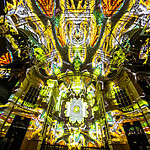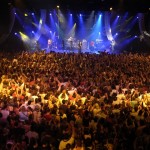Rupert Parker Is Stunned By The Level Of Improvisation At The Jazz Café.
These days the Jazz Café, in the heart of Camden Town, is home to a wide variety of music, jazz being only one of many genres. So a night billed as free avant-garde improvisation is always something special – the intimate space is a unique opportunity to see musicians close up, study what they’re doing and catch every nuance.
Funnily enough, although tonight’s performance is labelled as jazz, the band leader, guitarist Marc Ribot, has worked with a wide range of iconic musicians. These include Tom Waits, Elvis Costello, Laurie Anderson, Caetano Veloso, Robert Plant and Elton John.

His playing is deeply informed by the avant-garde and free jazz traditions – influences include Derek Bailey, Albert Ayler, and Ornette Coleman. But he’s also a devoted student of American roots music, Cuban music, and classical guitar. His guitar playing moves freely between dissonant noise improvisation and lyrical, melodic playing.
The Hurry Red Telephone quartet is rooted in a shared love for exploratory, free‑jazz-infused expression. Ribot describes the formation as a continuation of his early 2000’s Albert Ayler Spiritual Unity project. The band is Ribot and Ava Mendoza on guitar, Sebastian Steinberg on bass and Chad Taylor on drums. They promise to deliver a potent fusion of poetry, free improvisation, and rock energy.
So nobody quite knows what to expect as the musicians arrive on stage. The first number has Ribot shouting his vocals over an intricate interplay of guitar, bass and drums. Yet this shock opener soon morphs into something more lyrical. Indeed there’s no space between tunes and no announcements from the stage, apart from name checking the musicians.
Hunched over his guitar, Ribot’s control is masterful – one moment whispering delicate harmonies, the next ripping into dissonant clusters with unapologetic punk grime and grit. Ava Mendoza’s solos match his fearless aesthetic, balancing raw edge and nuanced sensitivity. Together, they form a dual-front assault: both conversant in tradition, both equally unafraid to dismantle it.


Keeping up and adding texture and rhythm to the mix, Steinberg’s deep grooves lock in with Taylor’s fluid rhythms. Together they create a solid ground for Ribot and Mendoza to explore wildly divergent textures, punctuated by raw, motor oil smothered shared riffs. This maelstrom of sound sometimes can be pleasingly lyrical until suddenly exploding into chaos again.
Marc Ribot’s Hurry Red Telephone is a compelling synthesis: indebted to jazz and blues traditions, yet constantly defacing its own blueprints. It’s unpredictable, poetic, even political – a thrilling reminder that jazz isn’t just performance, it’s an act of living inquiry. This wasn’t a “sit‑back-and-relax” jazz night, it was visceral and immediate, a full‑throttle ride. A few didn’t last the course but those who did stumbled out into the night shaken, smiling and all buzzing.
Tell Me More About The Incredible Sound Of Mark Ribot’s Hurry Red Telephone At The Jazz Café, Camden, London
Here’s a list of upcoming gigs at the venue.
The Jazz Café 5 Parkway, Camden, London NW1 7PG






